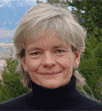Lisa J. Graumlich
From an “Ecologist Directory” maintained by the ESA Education Office about 2004-2005. Profile circa 2004.
Degree Ph.D. 1985 (University of Washington)
Position Executive Director & Professor
Department Big Sky Institute for Science and Natural History
Organization Montana State University
When did you get interested in ecology? Who was most influential in guiding you into ecology?

As an undergraduate, I had a terrible time deciding on a major. After my sophomore year, instead of choosing a major, I took a leave of absence to travel. I spent almost a year in South America, traveling along the spine of the Andes and eventually participating in a research project among subsistence farmers in the Amazon Basin. When I returned to my studies at the University of Wisconsin, Ed Beal and Hugh Iltis in the Botany Department were resources for my many questions regarding tropical ecology. In addition, geographers Paul Blank and William Denevan inspired me to start thinking about how humans interact with landscapes, a classic topic in geography that has only recently captured the imagination of many ecologists.
How did you learn about ecological careers? What is your position title now?
My current position title is Executive Director of the Big Sky Institute and Professor of Land Resources and Environmental Sciences at Montana State University. As an Executive Director of an interdisciplinary institute, I work with partners including other faculty members, federal and state research scientists and private land owners to link university-based research to critical environmental issues in the Greater Yellowstone Ecosystem. As a Professor, I teach university classes, mentor students and conduct research. I love my position in the University because it is highly varied, very challenging and offers great intellectual autonomy. I chose an academic career over other options because of my strong preference for the autonomy and self-direction that comes with a faculty appointment.
Describe your route to a career in (or using) ecology. What challenges did you need to overcome? What was your training, and what positions have you held?
My goal in studying ecology was to meld it with an understanding of the global climate system in order to address issues of global change and terrestrial ecosystem response. The greatest challenge in pursuing these objectives was to gain adequate expertise in multiple disciplines (i.e., ecology, climatology, resource management) in order to be to do innovative research at the interface of those disciplines. This requires time, effort, and an ability to put together education and research programs that fall outside traditional department’s norms. I’m happy to observe that the current climate on university campuses is much more supportive of interdisciplinary scholarship. Never-the-less, the challenge remains that working between disciplines requires extra effort to master the concepts and techniques of more than one subject matter. My ability to work at the interface of ecology and climatology has been based on training across these disciplines. I received a BS in Botany from the University of Wisconsin and an MS in Geography from the same institution. I received a Ph.D. in Forest Resources from the University of Washington and was a post-doctoral fellow in the Department of Ecology, Evolution and Behavior at the University of Minnesota.
What key advice would you offer a student today?
The best advice I can offer students of today is to hone and practice their critical thinking skills at every opportunity. Participate as fully as possible in seminars. Read deeply in your field and widely in related fields. Engage in scholarly dialog with your peers. And, have fun doing it.
What advice do you have for communicating ecology to diverse audiences?
A major responsibility in my current position is communicating ecology to diverse audiences. My effectiveness seems to be directly correlated with two factors: 1) the degree to which I know and understand my audience; and 2) the degree of planning that we put into our communication strategies. Arguably, effective communication requires almost as much skill, planning, and background knowledge as the research that is being communicated!
Save